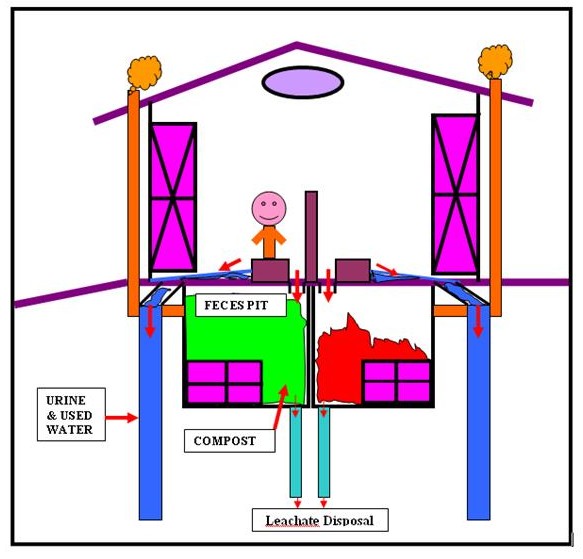Water-associated microorganisms called pathogens consist of bacteria, viruses and worms which cause a variety of fatal diseases. The bacteria can cause cholera, bacillary dysentery (shigellosis), typhoid, and paratyphoid fever. The viruses can cause infectious hepatitis and poliomyletis, protozoa responsible for amebic dysentery, giardiasis, and cryptosporidiosis. Helminthes which are known as parasitic worms cause schistosomiasis and dracunculiasis (also known as guinea-worm disease).
can supply clean drinking water for one family

Water contamination by human feces is by far the most important one. An infected individual’s intestinal discharge may contribute billions of these pathogens even without any symptom on the part of the individual. Among the virus group of human feces-excreted pathogens, adenoviruses can cause respiratory and eye infections, enteroviruses group (polioviruses, poliomyelitis, echoviruses, and coxsackie viruses) can cause aseptic meningitis, poliomyelitis, diarrhea, respiratory infections, herpangina, and myocarditis, hepatitis A virus can cause infectious hepatitis, and other viruses can cause gastroenteritis and diarrhea; among the bacterium group viruses salmonella typhi can cause typhoid fever, salmonella paratyphi can cause paratyphoid fever, other salmonellae can cause gastroenteritis, shigella species can cause bacillary dysentery, vibrio cholera can cause cholera, other vibrios can cause diarrhea, and Yersinia enterocolitica can cause gastroenteritis; among the protozoan group entamoeba histolytica causes amoebic dysentery, giardia lamblia causes diarrhea, and cryptosporidium species, too, causes diarrhea; and among the helminth group viruses ancylostoma duodenale is hookworm, ascarislumbricoides (roundworm) causes ascariasis, hymenolepis nana (dwarf tapeworm) causes hymenolepiasis, necator americanus (hookworm) causes hookworm, strongyloides stercoralis (threadworm) causes strongyloidiasis, and trichuris trichiura (whipworm) causes trichuriasis. Entrance of these pathogens to water supply can cause wide spread epidemics. It is very important to keep our water supplies safe from contamination by human waste (Hammer & Hammer, 1996).
Waterborne diseases like cholera and typhoid are spread through ingestion of contaminated water; water-washed diseases like trachoma and scabia are associated with insufficient water to maintain cleanliness; water-based diseases like shistosomiasis and dracunculiasis involve merely water contact; and water-related diseases like malaria and dengue involve a water-dependent host. From a UNEP report of the nineties
In a 1993 statistics UNEP shows greater than 1.5 billion morbidities, 4 million mortalities, and greater than 2 billion at risk population from diarrheal diseases, 200 million morbidities, 200,000 mortalities, and 500-600 million at risk population from schistosomiasis; 267 million morbidities, 1-2 million mortalities, and 2.1 billion at risk population from malaria; and 18 million morbidities, 20 to 50,000 mortalities, and 90 million at risk population from onchocerciasis. Schistosomiasis is the most common water-related disease in the world and is related to a large extent to water-resource development projects. A free-swimming larvae in water called cercaria, attach themselves to human skin, penetrate it, and enters the bloodstream. They mature in the liver where they lay large quantities of eggs in the intestine walls. Excreted eggs in water hatch and within hours find a small host for the development into new cercaria. Development projects such as dams and irrigation canals built with poor sanitation favors schistomiasis increase by creating stagnant water conditions needed by the immediate snail hosts.
Cryptosporidium parvum, a protozoan parasite, causes the gastrointestinal illness cryptosporidiosis marked by diarrhea, abdominal pain, nausea, and vomiting. It is life-threatening for individual with weak immune systems. Most cases of this disease are associated with water supplies contaminated with cattle feces from agricultural runoffs. Billions of oocysts (eggs) are shed daily by an infected cow. Even the most sparkling stream water carries the risk of giardiasis, a less deadly than Crysptosporidium, caused by the Giardia lamblia (Masters and Ela, 2008).
In the USA, after the introduction of chlorination in 1908, outbreaks of waterborne diseases like typhoid and cholera became rare. Even these days, inadequate sanitation in developing countries contributes to high rates of disease and death. WHO blames 80 to 100 % illness caused by cholera, typhoid, and guinea-worm infection could be prevented in developing countries with improved water supply and sanitary disposal of water supply (UNEP, 1993).
More than one billion people do not have access to clean drinking water, nearly 2.5 billion lack adequate sanitation services. Annual death rates from diarrheal diseases are about 1.8 million. Globally, daily water-associated children deaths are estimated to be 10,000 to 20,000 in the absence of preventable measures (Gleick, 2011).
In view of the risks of using unclean water and upstream nations’ water grabbing attitude depriving downstream nations’ water rights, it has become imperative to conserve water and to purify water by Mukti Water Treatment Technology and improved sewer systems. Considering all these potential pitfalls associated with the elixir of life, Academy of Healthy Water, Ecosystem and Environment (ahwee) has come forward with a helping hand for the global population. AHWEE’s research team has designed a latrine system for developing nations that separates feces from urine and used water. The purpose of this system is to reduce the volume of waste as well as establish beneficial applications of the waste such as making fertilizer.
Used bathing water can be recollected and then reused as drinkable water and other agricultural purposes by using proper methods of purification.
In most underdeveloped nations, the cost of construction of an Eco-friendly latrine system ranges from 4000 to 5000 US dollars for about 1000 people.
Copyright © 2025 Humane Water. All Rights Reserved. Business Website Design & Hosting by Alpha Net. Powered By Alpha CMS